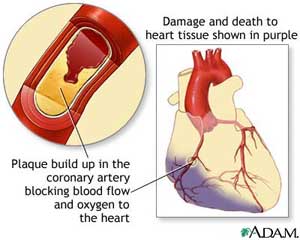 Cardiovascular disease is the most common cause of death in the United States according to the Center for disease control and prevention. Common risk factors for cardiovascular disease include: hypertension (high blood pressure), high cholesterol, diabetes, obesity, family history, cigarette smoking, alcohol intake, metabolic syndrome, and physical inactivity.
Cardiovascular disease is the most common cause of death in the United States according to the Center for disease control and prevention. Common risk factors for cardiovascular disease include: hypertension (high blood pressure), high cholesterol, diabetes, obesity, family history, cigarette smoking, alcohol intake, metabolic syndrome, and physical inactivity.
From that list, there are plenty of risk factors that are deemed, modifiable, which means you can make changes to reduce your risk. For many people quitting smoking, eating healthier, losing weight, or getting more exercise are more difficult than they sound. It takes a lifetime to develop bad habits, so it’s not surprising that it’s difficult to change.
Taking a step back and becoming more aware of these bad habits along with spending more time considering their consequences can help towards making healthier lifestyle choices.
Aside from those measures, there’s also some research that taking a simple multivitamin may actually reduce your risk of having a myocardial infarction (MI) or heart attack.
Do multivitamin supplements reduce cardiovascular disease risk?
Researchers in Stockholm Sweden followed over 36,000 women with no history of heart disease (cardiovascular disease – CVD) along with 2262 women with a history of heart disease for a period of just over ten years. The women included in this study were between the ages of 49-83 years of age.
Participants in this population-based cohort study were surveyed on their use of dietary supplements, diet, and lifestyle factors. The multivitamins used were estimated to contain close to the recommended daily allowances of:
vitamin A (0.9 mg), vitamin C (60 mg), vitamin D (5 μg), vitamin E (9 mg), thiamine (1.2 mg), riboflavin (1.4 mg), vitamin B-6 (1.8 mg), vitamin B-12 (3 μg), and folic acid (400 μg).
What did the study authors find?
CONCLUSIONS: The use of multivitamins was inversely associated with MI, especially long-term use among women with no CVD. Further prospective studies with detailed information on the content of preparations and the duration of use are needed to confirm or refute our findings.
What does this mean? For women who didn’t have a history of CVD, if they took a multivitamin for greater than five years, they were 41% less likely to suffer from CVD than women who did not when other factors were adjusted for!
Previous research in Sweden found that taking a low dose multivitamin daily was effective for the prevention of heart attacks in both men and women (Holmquist):
Findings from this study indicate that use of low dose multivitamin supplements may aid in the primary prevention of MI.
What should you do?
In addition to medical treatment from your physician which may include medication for blood pressure, high cholesterol, or blood thinners…
To start with, let’s keep things in perspective. Clearly, addressing the most important modifiable such as your weight, diet, exercise level, and quitting smoking are the most important steps. At the same time, research suggests that taking a multivitamin daily also may help. I myself do take a multivitamin every day.
Summary of steps to lower your risk of Cardiovascular Disease:
- Achieve and maintain ideal body weight
- Include a variety of fruits, vegetables, legumes, nuts, soy products, and low-fat dairy products in your diet.
- Eat baked or broiled fish at least twice per week
- Limit intake of saturated fat and trans fat/ try to consume food rich in omega-3 fatty acids
- Limit alcohol intake (less than 2 drinks per day for men / 1 drink per day for women.
- Reduce salt intake (< 2400 mg/d of sodium)
- Exercise – Walking 30 minutes per day can reduce your risk of MI by as much as 50%!!!
- Quit Smoking
- Talk to your doctor about Aspirin use (risk of bleeding) but effective for reducing risk of MI.
- Proper medical care for conditions such as diabetes, high blood pressure, etc.
References:
- Rautiainen S, Akesson A, Levitan EB, Morgenstern R, Mittleman MA, Wolk A. Multivitamin use and the risk of myocardial infarction: a population-based cohort of Swedish women. Am J Clin Nutr. 2010 Sep 22.
- Christina Holmquist, Susanna Larsson, Alicja Wolk and Ulf de Faire. Multivitamin Supplements Are Inversely Associated with Risk of Myocardial Infarction in Men and Women—Stockholm Heart Epidemiology Program (SHEEP). The American Society for Nutritional Sciences J. Nutr. 133:2650-2654, August 2003.





